NHS Wales waiting times: Record number wait a year or more
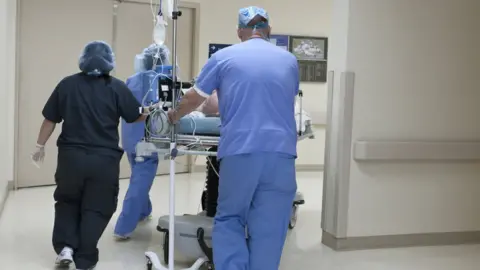 Getty Images
Getty ImagesWaiting times for hospital treatment in Wales have again reached record levels, latest monthly figures show.
The very longest waits - those of more than two years - are continuing to fall, albeit slowly, although 62,136 are still waiting that long.
But waits of more than a year have hit nearly 178,000 - a record. Overall, figures for June show more than 732,241 waits for hospital treatment.
Meanwhile, Wrexham Maelor hospital had the worst monthly A&E performance ever.
Betsi Cadwaladr University Health Board, which counts Wrexham Maelor among its hospitals, said there was currently an unprecedented demand on its emergency departments across north Wales.

The latest NHS performance figures published on Thursday showed a 26th successive month of rising waiting lists.
The total number of "patient pathways" with waits of more than nine months have also reached the highest level on record at just under 264,000.
As one patient may be on several "pathways" to treatment, the number of patients affected will be lower.
So it is estimated there are about 576,000 actual individual patients on treatment waiting lists in Wales.
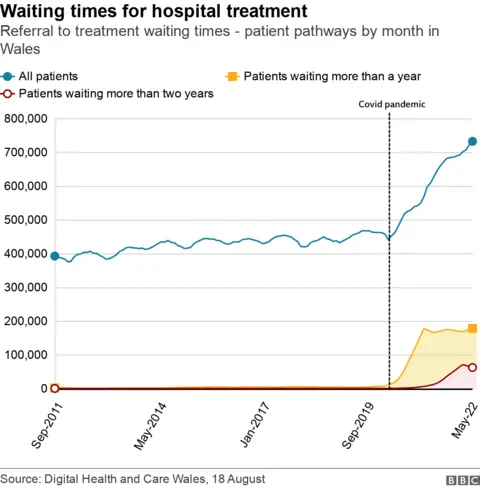

This chart shows how those waiting longer than two years have started to go down after rising sharply during the pandemic.
There were 240 people waiting more than two years in February 2020 but that rose to a peak of 70,417 in March 2022. That's now dropped by 2,917 to 62,136 in June.
There were still 177,964 pathways of patients waiting more than 12 months.
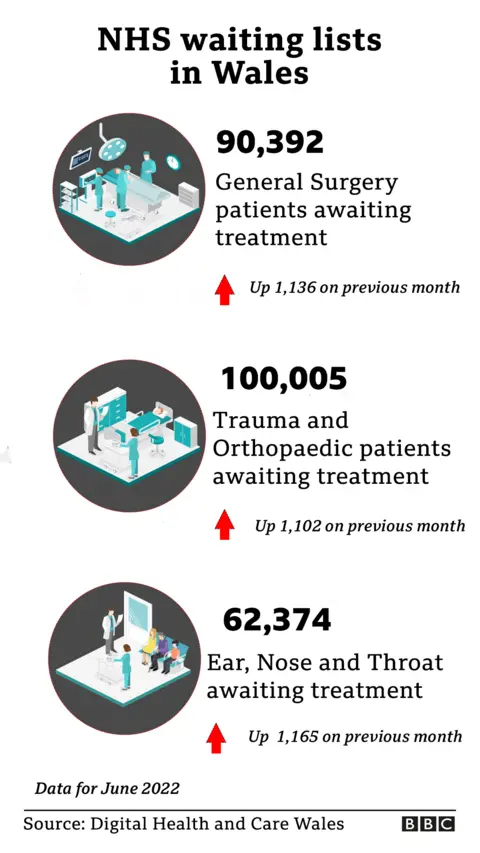

Numbers of patient pathways in orthopaedics has passed the 100,000 mark, while those waiting more than nine months for treatment stayed roughly the same at 53,513
There were also rises in specialisms such as ear, nose and throat and in general surgery.
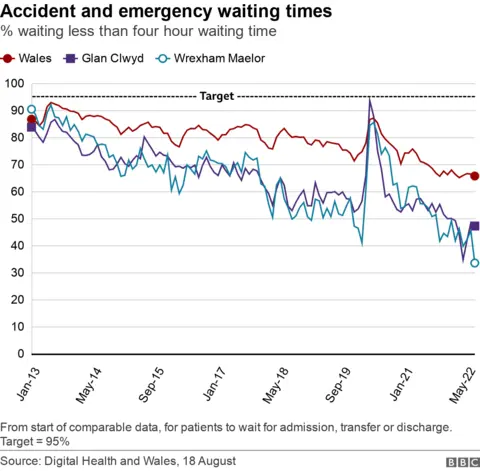

Waiting times in emergency units worst for four months
- The performance against the four-hour target was the worst for four months and the third lowest on record - with 65.7% of people seen within four hours at A&E in July, compared with 66.4% in June. The target, never met, is 95%
- Wrexham Maelor hospital recorded the worst monthly performance of any Welsh A&E on record, with only 33.5% of patients being seen within four hours. Nearly 3,200 patients at the hospital faced waits of more than four hours in July - and 1,300 of these more than 12 hours
- The previous worst performance was 34.7% at Ysbyty Glan Clwyd in Denbighshire in April. That hospital's figure for July stands at 47.2%
- Across Wales, there were 447 more patients waiting longer than 12 hours to be treated, compared with the previous month. This is the second worst on record. There were still 10,696 waiting and the target is that no-one should be waiting this long
- Average daily attendances at A&E during July were about the same as the previous month
- The median waiting time was 2 hours and 59 minutes - below the record and three minutes faster than the previous month
Highest number of 'red' ambulance calls
In July there were 4,130 "red" or life threatening calls to the ambulance service, 10.5% of all calls, the highest for both on record.
The target is to reach 65% in eight minutes, but in July the figure was 52% - an improvement on the previous month. The target has not been met for two years, covering the pandemic period.
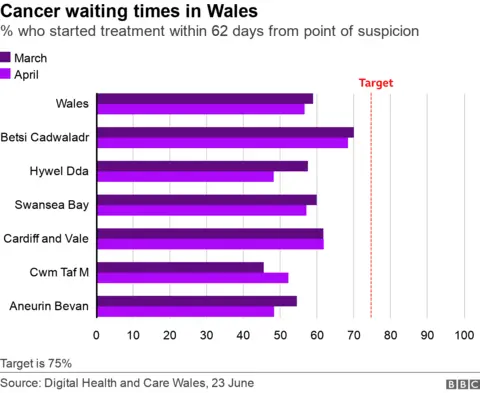

Cancer waiting times slight improvement
There has been a slight monthly improvement on last month's worst cancer care figures, with 54% of newly-diagnosed people starting their treatment within the target of 62 days.
This is 14.1 percentage points lower than June 2021.
Jon Antoniazzi, of Macmillan Cancer Support in Wales, said: "While it's heartening to see a marginal improvement on cancer waiting times in Wales in the latest data, the stark truth is that just over half of people living with cancer here were treated on time in June.
"This means in June alone around 747 people with cancer in Wales faced concerning delays in starting their treatment on time.
"Despite the hard work and best efforts of cancer care staff, who are dealing with more referrals for suspected cancer than ever before, cancer care in Wales needs urgent focus to improve waiting times."
What's been the response?
The Welsh government said there continued to be high demand for emergency care, with almost 92,000 attendances at Welsh emergency departments, and the highest level of demand on record for immediately life-threatening ambulance calls.
"Despite this, the majority of patients continue to receive timely access to the care they need with the average wait time for people to be seen shortening," said a spokesperson.
They added "progress continues to be made" to reduce the longest waits, pointing to the two-year waiting list falling for the third consecutive month and being 12% lower than the peak in March.
Conservative health spokesman Russell George accused the Welsh government of complacency, adding: "It is incredibly dispiriting to see progress being made in other parts of the UK, but people in Wales are still suffering in a health system that is not working."
He repeated his call for regional surgical hubs and rapid diagnostic centres to deal with the backlog.
Betsi Cadwaladr University Health Board (BCUHB) said it had seen more than 2,000 people attend its emergency departments since Friday.
"The high number of patients together with the difficulty in discharging medically-fit patients from hospital is leading to significant bed shortages across the sites, the health board said.
"This is having an impact on planned surgery being able to go ahead and also lengthy ambulance waits outside our emergency departments, which means that paramedics are unable to respond to other emergency calls in our communities."
